South Africa
Temperature rising: Deja vu in De Doorns
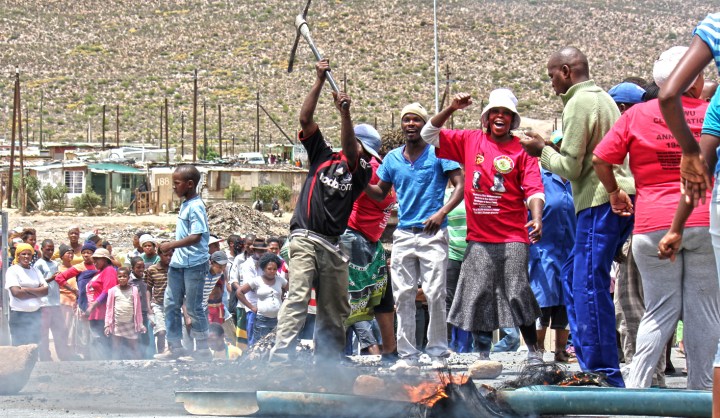
On Wednesday, farmworkers in the Hex River Valley resumed their strike for a higher daily wage in the face of continued protestations from farmers that they cannot meet their demands of R150 per day. While as few as 20% of permanent workers were estimated to be on strike in some areas, in the former strike epicentre of De Doorns, there were eerie echoes of November's chaos. By REBECCA DAVIS and KATE STEGEMAN.
At 7.30am in the small farming town of De Doorns, all was quiet. The broken windows of a shop looted in the last wave of strike action were the only visible testament to the unrest that rocked the region late last year. A small group of farmers chatting together across from the police station made dark jokes about the strikers’ demands. “If you pay them R150 a day they’ll make more than you!” one laughed to another. None of them would be named.
“Look at his bakkie,” one said, slapping the battered frame of his friend’s single-cab vehicle. “We’re not rich farmers! If we have to raise wages like that, I promise you, there will be at least 70% job losses come winter time, when there’s no work.”
Promises that Wednesday’s resumed strike action would be peaceful always seemed unlikely. If anything, the stakes for farmworkers are now higher than in November: January is traditionally a financially-straitened month, with parents facing the additional costs attached to the start of the new school year. Furthermore, the complexity of the winelands labour dispute was starkly illustrated by a report released on Tuesday by the Bureau for Food and Agricultural Policy, a think tank attached to the University of Pretoria.

Photo: An attempted march through the farmlands led by Nosey Pieterse was thwarted by the police presence (obscured by smoke)
The report found that farmers would not be able to pay more than R104 a day without having to implement greater mechanisation on their farms, at the possible expense of jobs. An increase to R150 a day, the report found, would cause food prices to rise, raise labour costs for the top 10 agricultural industries by R3,5 billion, and possibly effect the closure of many farms.
But the flipside finding of the report was that even if the farmworkers were granted their demanded wage of R150 a day, that would still not be enough to ensure a nutritionally-adequate diet. “Even at what seems to be an unaffordable minimum wage of R150 per day, most households cannot provide the nutrition that is needed to make them food secure,” the report concluded.
On the one hand, then, we have farmworkers who are clearly being paid too little. On the other hand, we have farmers who maintain that to substantially raise wages will scupper the viability of their farms and destroy much-needed jobs for the farmworkers themselves. But the hostility between the two sides is heightened by the fact that farmworkers simply do not believe this to be true: pretty much across the board, it seems that farmers are believed to live lives of enormous ease and affluence.
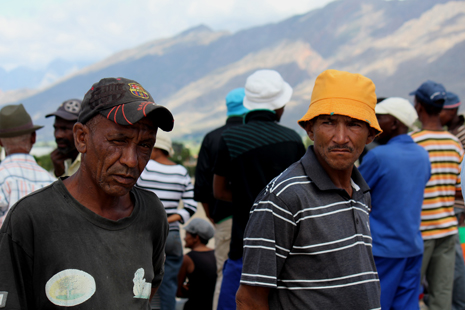
Photo: Kevin January (left) is intent on continuing strike action until their demands are met
In De Doorns East, an informal settlement just outside the town, a small crowd slowly gathered in a stadium. Organisers from Bawusa, the Bawsi Agricultural Workers Union, set up a PA system to play music. The mood was initially calm, even festive. But a hint as to the skittishness of the crowd was felt mid-morning, when four police Casspirs suddenly roared into life, perhaps prompted by some unseen threat, and sped up the road into the informal settlement. The response of the crowd was instantaneous: to scatter sprinting in the opposite direction, despite organisers’ pleas for calm. The mood was broken, and from here matters became progressively more volatile over the next hours.
“These farmers are talking bullshit,” said a 25-year-old Bawusa member, who declined to be named. “These farmers are driving bakkies that cost half a million rand. All these years these people are getting away with it. Now with the negotiations they have lawyers, consultants, everything. Farmworkers have nothing.”

Photo: Armoured police vehicles are flanked by burning tyres on a bridge overlooking the De Doorns stadium
Yoga Govender, who has been working on a local grape farm for 25 years, said that he was not a union member, but he was striking for higher wages. “We earn R80 per day, and we pay R100 per fortnight for accommodation on the farm plus R80 per week for lights,” he said. “When we get paid today, we have to take loans tomorrow. Their children are in top-notch schools. After every season the farmers buy two trucks. They told us yesterday, if you don’t come to work, your bonuses are gone. I said, our bonuses are important but so are our families’ lives!”
Govender said he saw the way out of the dispute as fairly straightforward. “If other workers will stand with us, grapes will start to rot on the vine. Then I guarantee they will give us the R150.”
Kevin January, 49, a seasonal worker on a variety of local farms, also gets paid R80 per day. Like Govender, he was adamant that the farmworkers would not back down from their demands. “We will intensify the strike,” he said.
From the vantage point of a bridge nearby, strikers began to throw rocks at the police stationed below. The crowd cheered them on.
Betty Fortuin, a 50-year-old who has been working on farms since she was 13, told the story of being evicted from a farm because she asked if she could bring her late brother’s orphaned children to live with her. She, too, earned R80. “It’s fokol!” she yelled. “Did you see on TV how expensive the stationery is for school?”
Fortuin echoed Govender’s prediction almost word for word. “If we all stick together, their grapes will be raisins and they will give us our R150!”
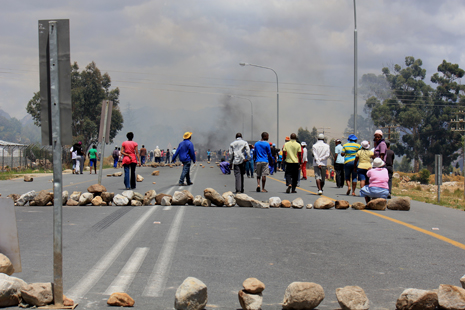
Photo: The N1 was closed throughout the day due to rocks and other impediments strewn across the road
None of the striking farmworkers we spoke to seemed aware that Agri Wes-Kaap’s counter offer of a sectoral minimum wage raise on behalf of farmers was just R85 per day, according to Agri Wes-Kaap president Cornie Swart. Swart told the Daily Maverick that even this marginal raise would cause financial difficulties, particularly in the table grape industry.
“A lot of farmers will still need to scale down and mechanise,” he said. “We would estimate that there will be the loss of around 200,000 jobs in the Western Cape, unfortunately.”
Back in De Doorns, the atmosphere had turned more hostile by noon. Rocks were thrown at passing fruit trucks, with calls from the crowds to burn them. Private vehicles and taxis subsequently also became targets. Police responded with fusillades of rubber bullets, sending protestors scattering for cover. Some huddled behind journalists’ cars. With police unable to hold back strikers, rocks were hurled on to the N1 and tyres burned to render the motorway impassable.
The arrival of Bawusa general secretary Nosey Pieterse initially seemed to hold the promise of calming the situation: he seems to have developed something of a cult of personality in certain quarters. In what he later claimed to the Daily Maverick was an attempt to defuse the situation, Pieterse led the crowd out of the stadium in what was intended to be a march through the farms. But the resulting scenes were chaotic, with the police attempting to control matters from the front with further rubber bullet fire, causing the crowd to periodically stampede backwards in an attempt to escape.
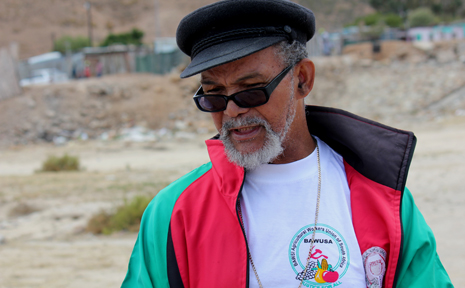
Photo: Nosey Pieterse, secretary general of Bawusa, was shot by a rubber bullet while leading the march
Pieterse’s account paints the strikers as blameless. “We were marching peacefully and without provocation when police jumped out backwards and started shooting,” he told the Daily Maverick. Pieterse himself received a rubber bullet in his arm, and rolled up his sleeve to display the injury. “I could not control the crowd after that. They were too angry. We tried to get people back to the stadium, but it was very difficult.”
In the ensuing chaos, two Cape Times journalists found themselves in the crossfire. An NGO worker who witnessed the event told us that the angry crowd was attempting to reach a police van, and were impatient about the presence of an Independent Newspapers car in their path. “They circled the car and were banging the windows and rocking it,” the eyewitness said. When Xolani Koyana and an intern got out of the car, they were reportedly assaulted, but bystanders were able to get them away to a local priest’s house. The car was subsequently overturned and torched.
The hostility towards journalists was not limited to this event: several others were threatened. In a later incident, when the crowd had returned to the stadium, another eyewitness told us that there was a moment when a number of strikers seemed about to turn on a lone photographer, until Nosey Pieterse instructed the crowd that journalists were essential to tell their story. The source of this antipathy towards the media is unclear, although a number of farmworkers told us that they felt the violent actions of strikers was always highlighted on news reports without commensurate attention paid to the violence of the police.
Pieterse says it isn’t surprising that the crowd was so angry. “Nobody talks about the intimidation of striking workers by the police, only the intimidation of non-striking workers.” Throughout our conversation with Pieterse, a police helicopter circled relentlessly overhead, certainly heightening the tension of the atmosphere.
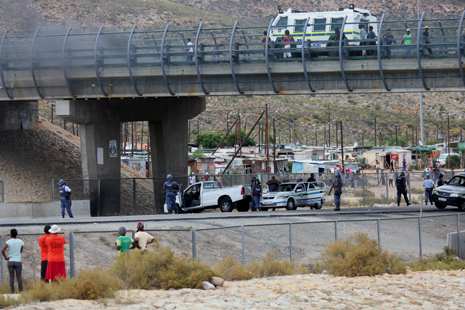
Photo: Police maintained a visible presence at the De Doorns informal settlement throughout the first day of reignited strike action
“Farmers have made it clear that they are not interested in collective bargaining,” Pieterse said. “We must force farmers to the table by getting more people out. We appeal to all farmworkers not to allow themselves to be intimidated.”
Where, we asked, was Cosatu’s Tony Ehrenreich? “Maybe he will be here tomorrow and I won’t”, replied Pieterse. He chuckled. “Me and Tony, we’re the terrible twins!”
Carmen Louw, from the NGO Women On Farms, said that despite Pieterse’s apparent hold on the crowd, most people present were not unionised. This was backed up by our conversations with a number of strikers. We asked Ester Krotz, 51, a farmworker for 36 years, if she was a member of a union. “Yes!” she replied immediately. Which one? “The ANC,” she said.
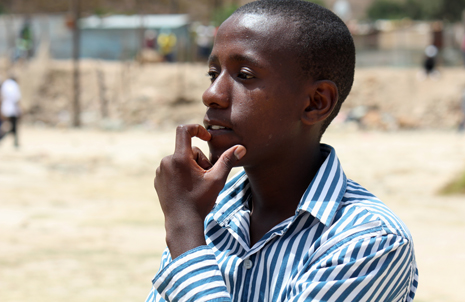
Photo:Raymond Kipido, a student at CPUT, is worried about how his parents will pay this year’s registration fees
Louw said that she believed the action at De Doorns would continue at least till Friday. We left the scene in a convoy with other journalists with the only escort who could guarantee our safety: Nosey Pieterse, driving a BMW 4×4. As we departed, police appeared to be entering the informal settlement on foot, and the crackle of rubber bullet fire continued.
But the poignancy of the De Doorns unrest lies not just in the apparent intransigence of the dispute, but also in the form of those caught up in it against their will. Raymond Kipido, 19, was standing quietly apart from the crowd with his friends Matthew December, 19, and Luckson Mooin, 19. The three stood out because they were wearing collared shirts and ties: they had just been to church, they explained. All three De Doorns locals are students at the Cape Peninsula University of Technology, studying Mechanical Engineering, Mathematical Technology and Chemical Engineering respectively.
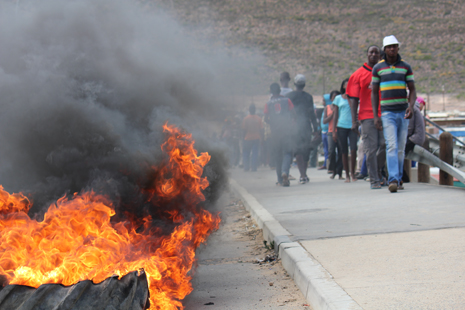
Photo: Burning tyres have become synonymous with protest action in the Cape farmlands
The parents of all three are farmworkers, who were staying away from work that day because – their sons said – they had been intimidated into doing so. “They were intimidated by the leaders,” said Kipido. But, he shrugged, “I don’t know who they are.”
Their parents have a pressing reason for not wanting to stay away from work at the moment, however meagre their salaries: the registration fees for all three boys at CPUT are due at various points within the next ten days. “I don’t know what we are going to do,” said Kipido. “Maybe I can explain to the university, if I can tell them where I live.” DM
All photos courtesy of Kate Stegemann.

















 Become an Insider
Become an Insider